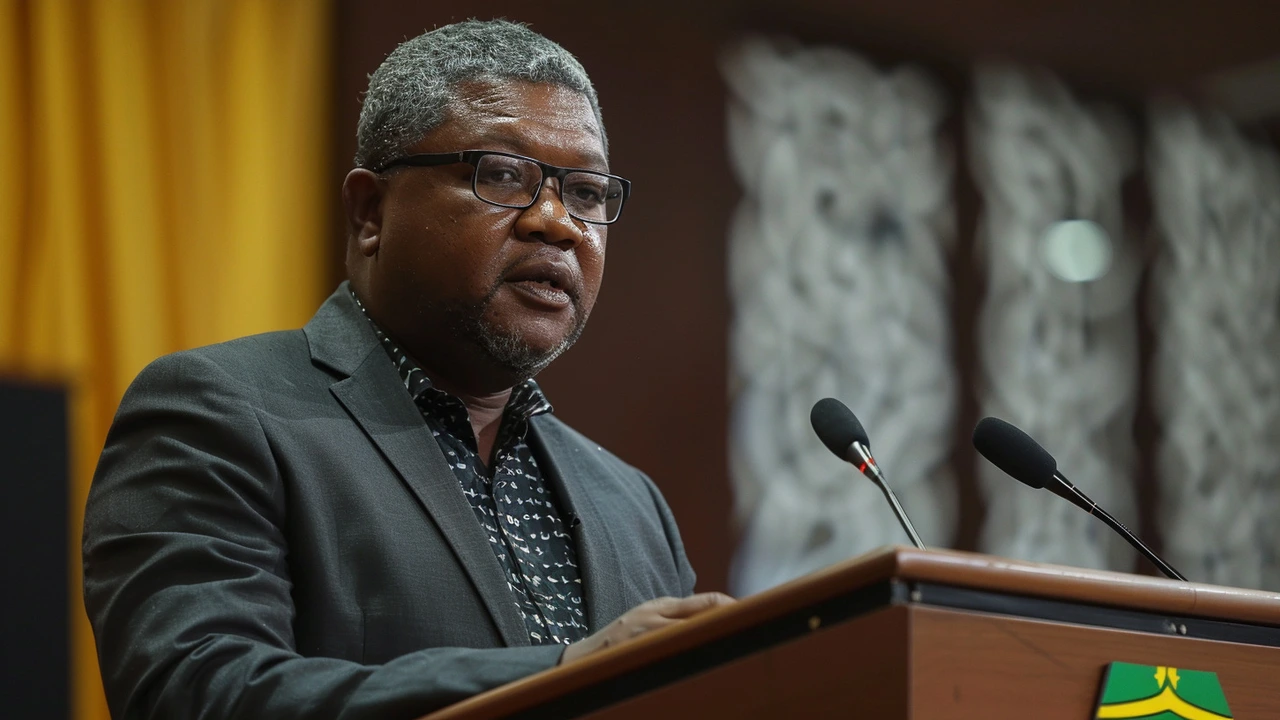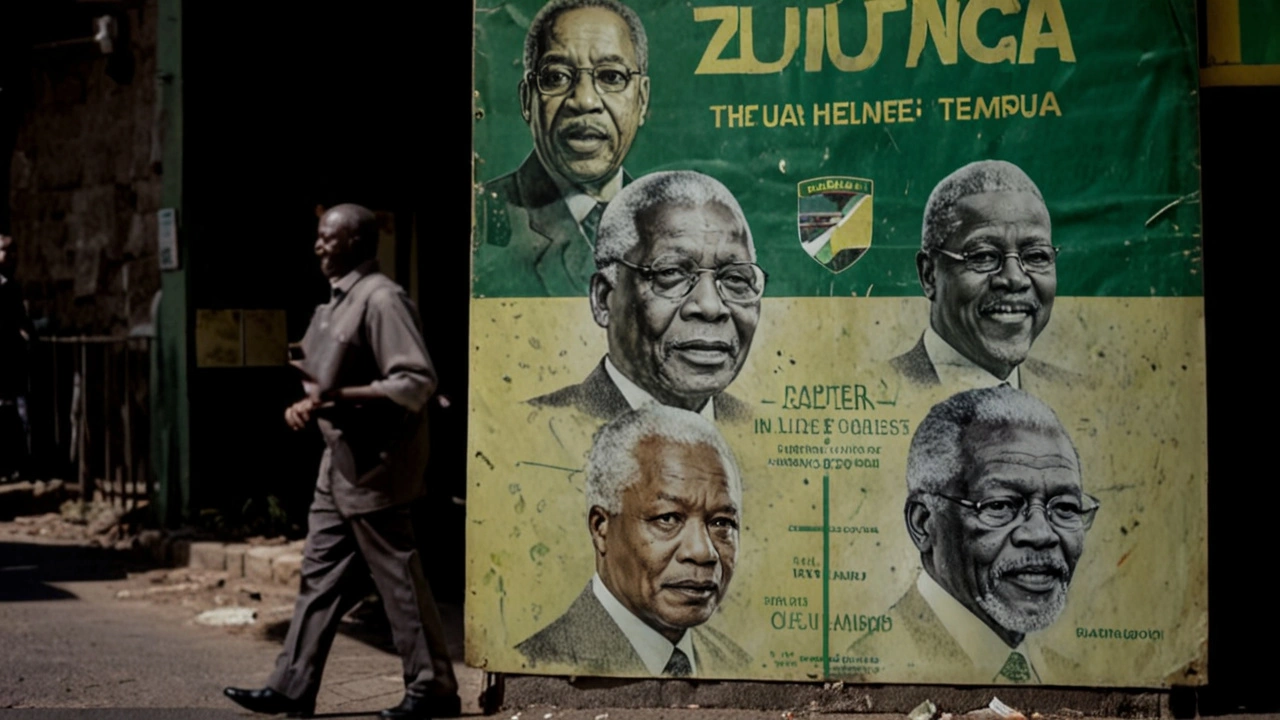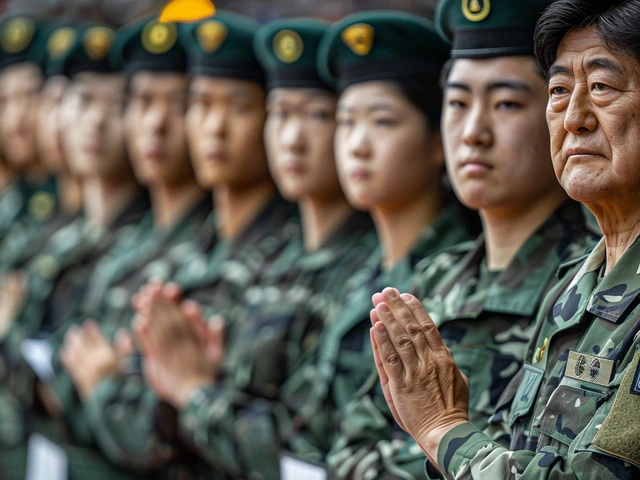Introduction to a Political Controversy
The political landscape in South Africa witnessed a significant revelation as Fikile Mbalula, the current Minister of Transport, acknowledged the alteration of the African National Congress (ANC) parliamentary lists. This admission came amidst allegations of manipulations intended to favor certain individuals within the party. Mbalula, who also serves as the head of elections for the ANC, initially refuted claims of such modifications. However, subsequent investigations by the party's integrity committee forced him to concede to the changes, though he firmly denied any personal involvement in the process.
The ANC, a predominant force in South African politics, has often been scrutinized for its internal processes and the transparency thereof. The integrity of its parliamentary lists is crucial as they determine the candidates who will represent the party in the national parliament. Any manipulation of these lists can significantly impact the political landscape of the nation, favoring certain factions within the party over others, and potentially altering policy directions and governance.
Unpacking the Admission by Mbalula
According to reports by the Mail & Guardian on May 5, 2024, Mbalula's admission opens up several discussions concerning the ethical standards of political conduct within the ANC. As the head of elections, Mbalula's role is pivotal in overseeing the fair conduct of candidate listings and elections within the party. His initial denial and subsequent admission call into question the internal dynamics and pressures within the ANC's leadership circles.
These developments have not only caused a ripple across the political spectrum of South Africa but have also instigated debates about the integrity of democratic processes within major political entities. The implications of such admissions extend beyond immediate political outcomes; they resonate with the electorate's trust in the political system. The ANC's commitment to transparency and fairness is under close watch, now more than ever.
The Role of the ANC's Integrity Committee
The ANC's integrity committee plays a crucial role in maintaining ethical standards and accountability within the party. This body is tasked with investigating any claims of misconduct or deviation from the party's code of conduct, and it was this committee's investigation that led to Mbalula's admission. The committee's involvement indicates the seriousness with which the party is approaching allegations of internal manipulation and corruption.
The outcomes of such investigations are critical in shaping public perception and trust in the party. They are supposed to act as mechanisms to correct any deviations and ensure that all party members adhere to a standardized ethical guideline. The functioning of this committee is, therefore, a bellwether for the party's health and its adherence to democratic principles.
Political Implications and Public Reaction
The revelations have stirred various sentiments among the public and political analysts. While some appreciate the transparency eventually shown by the party's acknowledgment of the issue, others are skeptical of the timing and the sincerity of the admission. Questions are being raised about the potential candidates who might have been unfairly favored or sidelined due to these alterations.
Public faith in electoral processes is fundamental to the functioning of democracy. When incidents such as these come to light, they necessitate a thorough examination not just of the specific incident but of the overall health of political governance. The ANC's future political strategies and their approach towards internal regulations will be closely monitored by both national and international observers.
Conclusion: A Test of Integrity for ANC
The unfolding of events around the ANC's parliamentary list alterations presents a test of integrity and governance within one of South Africa's most storied political parties. How the ANC navigates this controversy will be telling of its commitment to democratic principles and transparency. For Mbalula, despite his denials of personal involvement, this situation poses challenges to his political image and future within the party. As the situation develops, it will undoubtedly provide further insights into the workings of political power and responsibility in South Africa.








abi rama
May 6, 2024 AT 18:30 PMIt's a relief to see anyone in the ANC acknowledging a problem instead of sweeping it under the carpet. Transparency, even when it reveals mistakes, is the first step toward rebuilding public trust. Hopefully this admission leads to a thorough review of the list‑making process.
Megan Riley
May 6, 2024 AT 21:16 PMGreat move, Mbalula! 🙌🙌 Admittting the alteration shows you’re willing to face the music!!! Keep pushing for a clean slate-no more back‑room deals!!! Let’s make sure the next list is spotless!!!
Lester Focke
May 7, 2024 AT 00:03 AMThe alteration of parliamentary rosters, while not unprecedented in comparative politics, raises substantive concerns regarding the internal democratic mechanisms of the ANC. As the party's head of elections, Mbalula occupies a pivotal nexus between procedural integrity and partisan strategy. The integrity committee’s intervention, albeit tardy, signifies an emergent self‑regulatory response that may preempt more egregious breaches. Nonetheless, the opacity surrounding the criteria for these modifications warrants a rigorous scholarly examination to delineate systemic vulnerabilities.
Naveen Kumar Lokanatha
May 7, 2024 AT 02:50 AMThe committee’s role is indeed crucial it provides a check on unilateral decisions while also signalling to the electorate that accountability is not merely rhetorical however the speed of their findings could be improved we need clearer guidelines for list revisions to prevent future ambiguities
Alastair Moreton
May 7, 2024 AT 05:36 AMAnother typical ANC drama, nothing new.
Surya Shrestha
May 7, 2024 AT 08:23 AMIndeed, the pattern observed here is emblematic of a broader systemic malaise, wherein procedural loopholes are exploited, governance principles are marginalised, and the electorate’s confidence is eroded, thereby necessitating an immediate recalibration of internal oversight mechanisms, lest the party’s foundational legitimacy be irrevocably compromised.
Rahul kumar
May 7, 2024 AT 11:10 AMWhen a party adjusts its candidate lists after the deadline it directly contravenes the spirit of proportional representation, which is designed to reflect the voters’ will as accurately as possible. In South Africa’s electoral framework the list system was instituted precisely to avoid the kind of patronage politics that list‑tweaking embodies. By altering the lists, the ANC not only jeopardises its own credibility but also sets a dangerous precedent for other parties that might consider similar shortcuts. The integrity committee’s findings, therefore, should trigger a comprehensive audit of all recent list changes across the nation. Moreover, the legal statutes governing electoral conduct stipulate penalties for undue influence, which could be invoked if intentional manipulation is proven. From an operational standpoint, the party’s internal vetting process must incorporate transparent criteria, timelines, and independent oversight to ensure fairness. It would also be wise to subject the final list to a public verification stage, allowing civil society groups to flag discrepancies before submission to the electoral commission. The broader implication is that voters may become increasingly cynical if they perceive that party elites can unilaterally reshuffle candidates for personal or factional gain. Historical examples from other democracies show that such practices often lead to splinter groups and a loss of voter turnout. Therefore, the ANC should view this episode not merely as a scandal to be managed, but as an opportunity to reform its internal democracy. A re‑structuring of the election head’s authority, perhaps by distributing responsibilities among a committee rather than a single individual, could mitigate future abuses. Training programmes for officials on ethical standards would also reinforce a culture of accountability. Finally, the party must communicate openly about the steps being taken, providing timelines and expected outcomes, to rebuild trust among its base. In sum, the path forward demands both punitive measures for any wrongdoing and constructive reforms that strengthen the party’s commitment to democratic norms.
mary oconnell
May 7, 2024 AT 13:56 PMAh yes, because nothing screams “democratic renewal” like a backstage shuffle of names-truly the hallmark of a party that’s mastered the art of self‑deception. One might even argue that the very notion of “integrity” has become a philosophical construct, useful only for late‑night speeches and glossy press releases.
Michael Laffitte
May 7, 2024 AT 16:43 PMWhat a rollercoaster! From accusations to admissions, the ANC’s saga reminds us that politics is never dull-let’s hope the next chapter brings real change, not just more drama.